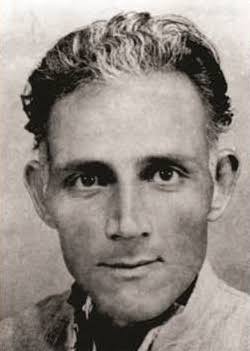Gajanan Madhav Muktibodh facts for kids
Quick facts for kids
Gajanan Madhav Muktibodh
|
|
|---|---|
 |
|
| Born | 13 November 1917 Sheopur, Central Provinces (present-day Chambal, Madhya Pradesh) |
| Died | 11 September 1964 (aged 46) Habibganj, India |
| Occupation | Writer, poet, essayist, literary critic, political critic |
Gajanan Madhav Muktibodh (गजानन माधव मुक्तिबोध) (13 November 1917 – 11 September 1964) was one of the most prominent Hindi poets, essayists, literary and political critics, and fiction writers of the 20th century.
Muktibodh is widely regarded as a pioneer of modern Hindi poetry in India along with Surya Kant Tripathi 'Nirala'. He was a leading figure in the Prayogvaad Experimentalism movement of Hindi literature and of the Nayi Kahani and Nayi Kavita Modernism of the 1950s. He is also considered a central figure in the rise of 'New Criticism' in Indian literature. He was an assistant-editor of several noted Hindi journals including Naya Khun and Vasudha.
Muktibodh was born in Sheopur, Madhya Pradesh. He started out as was one of the seven poets included in the first volume of Tar Saptak, a series of anthologies (1943), which marked a transition in Hindi literature from the prevalent movement in Chhayavaad or Romanticism. The initiation of Prayogvaad or Experimentalism and Pragativaad or Progressivism in Hindi poetry eventually led to the creation of the 'Nayi Kahani' (New Story) movement or Modernism.
Brahmarakshas (ब्रह्मराक्षस) is considered Muktibodh's most influential work in experimental poems, noted for the use of archetypal imagery. The poem is a depiction of the contemporary intellectual, who gets so lost in his own sense of perfectionism, unending calculations, and subjective interpretation of the external reality that he loses touch with reality itself, and eventually dies and fades away like a dead bird.
Muktibodh was deeply influenced by Marxism and Existentialism, and expressed his deep discontent with contemporary society. According to Sanjay K. Gautam, Muktibodh was "the most influential Marxist Hindi poet in postcolonial India, and one of the founders of modernism in Hindi poetry". He continued to show his progressive streak even after the disintegration of the Progressive Writers' Movement after 1953; and, through the rest of his career, he along with writers like Yashpal, continued his ideological fight against modernist and formalist trends in Hindi literature.
He is best known for his long poems:Brahma-rakshasa (ब्रह्मराक्षस), Chand ka Muh Teda hai (The Moon Wears a Crooked Smile) (चाँद का मुहँ टेढ़ा है), Andhere Mein (In the Dark) (अंधेरे में) and Bhuri Bhuri Khak Dhul (The Brown Dry Dust) (भूरी भूरी ख़ाक धूल); his complete works extending to 6 volumes, were published in 1980, as Muktibodh Rachnavali.
Sharadchandra Madhav Muktibodh (1921–1985), a Marathi poet, novelist, and Marxist critic, winner of Sahitya Akademi Award (1979) in Marathi, was the younger brother of Muktibodh
Works
His first individual book was published in 1964, when he was on his death-bed: (Chand Ka Muh Teda Hai [1] (चाँद का मुहँ टेढ़ा है). Although Muktibodh could not manage to get his works published, as a book in his lifetime, he was one of the contributing poets to the first three volumes of Tar Saptak, a series of path-breaking poetry anthologies, edited by Ajneya. "Bhoori Bhoori Khak Dhool" is the collection of his remaining poems. His collected works, published as 'Muktibodh Rachnavali" were edited by Nemichand Jain.
He is today considered a bridge between the Progressive movement in Hindi poetry and the Nayi Kavita (Modern poetry) movement.
Muktibodh made a name for himself in the field of criticism as well, with his strong views on the upper caste influence on the disintegration of Bhakti movement in India, which he viewed a lower caste uprising against the hegemony upper caste. In literary criticism, he wrote a critical work on Jaishankar Prasad's Kamayani titled: Kamayani, Ek Punarvichar.
Ek Sahityik ki Diary, first written for his column in the weekly Naya Khun, and later continued in the journal Vasudha (1957–60), offers a glimpse of his literary and socio-political criticism, and insights into his way of thinking, and was first published in 1964. It is most noted for the article, Teesra Kshana (Third Moment), where he shows his preference for the hypothesis of three successive stages in the creative process, of inspiration, impersonalisation and expression, rather than a single moment of inspiration
Media
|
(चाँद का मुहँ टेढ़ा है) |
The wind's sari border quivers bullets pierce empty |
| – Muktibodh |
A Hindi feature film, Satah Se Uthata Aadmi (Arising from the Surface), with script and dialogues by him, was directed by veteran film director, Mani Kaul, and shown at Cannes Film Festival in 1981. In 2004, "Brahmarakshas ka Shishya", a dramatization of Muktibodh's story, was presented in New Delhi by Soumyabrata Choudhury.
His novel, Vipatra has also been made into an audio book for the blind.
Legacy
His brilliance was recognized by the literary world after the posthumous publication of Chand Ka Munh Tedha Hai, the first collection of his poems, in the early 1960s. Ever since, the book has run into several editions, and is recognized as a modern classic. In his memory, Madhya Pradesh Sahitya Parishad, has instituted the annual MuktiBodh Puraskar.
In 2004, 'Muktibodh Smarak', a memorial was set up at the 'Triveni Sangrahalaya' in Rajnandgaon in Chhattisgarh, along with fellow poets of Chhattisgarh, Padumlal Punnalal Bakshi and Baldeo Prasad Mishra.


